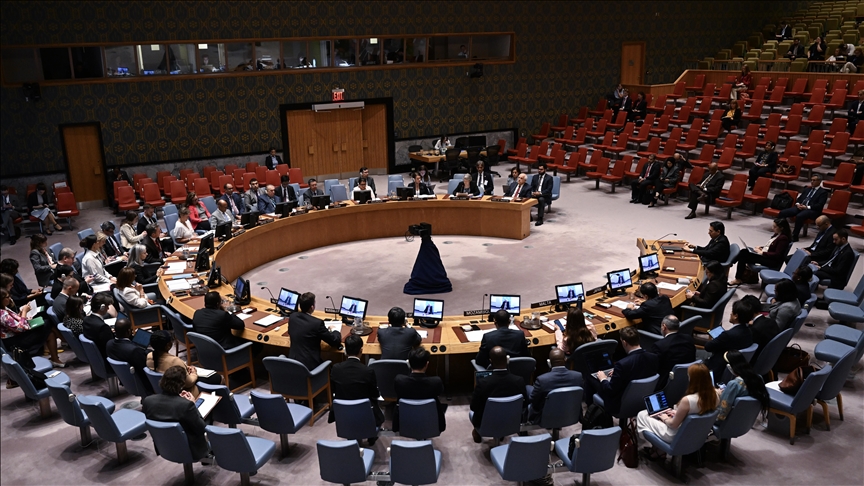WNAM REPORT: The UN Security Council on Friday warned about the deteriorating situation in the Gaza Strip and the occupied West Bank, highlighting the risk of a regional war because of Israel’s heavy bombardment against Lebanon.
Russian Foreign Minister Sergey Lavrov attended a UN Security Council session on the situation of Palestine, which was requested by Algeria’s mission at the UN.
Lavrov said the Palestinian issue is the root cause of all regional conflicts and noted it is “at the epicenter of the current confrontation in the Gaza Strip.”
He said Israeli military operation in Gaza has “become the most brutal and lengthiest in the entire succession of Arab-Israeli wars” and indicated that “the strip has become the largest open-air prison from which people simply cannot flee.”
The Russian minister denounced the “collective punishment” of Palestinians as “unacceptable.”
“The consequences in Gaza has triggered a sharp escalation in the Lebanon-Israel confrontation,” he said, warning that the Middle East “is at the precipice of a full-blown war.”
“We strongly condemn the actions of the Israeli side, which blatantly violates the sovereignty of the friendly country of Lebanon,” he said, denouncing civilian casualties.
He urged the full implementation of UN Security Council Resolution 1701, and expressed full support for the UN Interim Force in Lebanon (UNIFIL).
Resolution 1701, adopted Aug. 11, 2006, demands a complete cessation of hostilities between Lebanon and Israel and establishes a zone free of armed personnel and weapons, except for the Lebanese army and UNIFIL forces, between the Blue Line — the border between Lebanon and Israel — and the Litani River in southern Lebanon.
Lavrov also criticized the Council for inaction, suggesting it is “not merely a platform for exchanging views on the most pressing global issues.”
“The Security Council needs to place the interests of the peoples of Palestine and Israel above the short-sighted political calculations of certain actors and to demand an immediate cease-fire,” he said.
He also singled out the US envoy to the UN, Linda Thomas-Greenfield. “The choice is yours, either you continue to block the work of the Security Council, or you stand on the side of the world, on the side of the international community, and demand an end to the war,” he said. “Without your comprehensive support for Israel, the conflict could end quickly and effectively.”
China warns about regional spillover
China’s Foreign Minister Wang Yi highlighted the “unprecedented” situation in Gaza, describing it as “horrific.”
“The people in Gaza are suffering under bombardment and blockade and from hunger and disease,” said Yi, warning about the regional spillover.
He said the “regional hotspots are intertwined,” and urged the Security Council to not “sit idly by.”
He also encouraged the Council to support Palestine’s UN membership bid and make efforts toward a two-state solution.
Yi expressed concern about the “worrying” situation between Lebanon and Israel, demanding Israel uphold the sovereignty of Lebanon.
“China opposes all moves to abuse force and aggravate tensions in the regions. We condemn all actions that harm innocent civilians,” he said.
China urged a meeting on post-war reconstruction of the Gaze Strip and demanded Israel implement the “advisory opinion” of the International Court of Justice and end its illegal occupation of Palestinian territories.
For his part, Algeria’s Foreign Minister Ahmed Attaf noted the responsibility of the Council to resolve the violence in Gaza and said Israel’s attacks could trigger a regional war.
Describing the situation in Gaza as “genocide,” Attaf said, “We see an expansion of such to the West Bank.”
He denounced the lack of respect given to Security Council resolutions by illegal Israeli settlers.
Thomas-Greenfield, meanwhile, said an “all-out war” is possible but not inevitable.
“We are all too aware of the strong headwinds. However, there is still an opportunity to have a cease-fire with hostage release in Gaza and a diplomatic resolution of the conflict between Israel and Hezbollah,” she said.
“A more safe, peaceful, prosperous future for all lies not in the hands of the Security Council, but in the hands of decision-makers in the region,” she said as she continued to hold the Palestinian resistance group, Hamas, responsible for the inability to reach a cease-fire.
Thomas-Greenfield stressed that the Israeli violence from illegal settlers against Palestinians “is so very clearly unsustainable” in the occupied West Bank.
“Creating openings for diplomatic process takes political will, and it requires leaders to make some difficult decisions,” she added.


